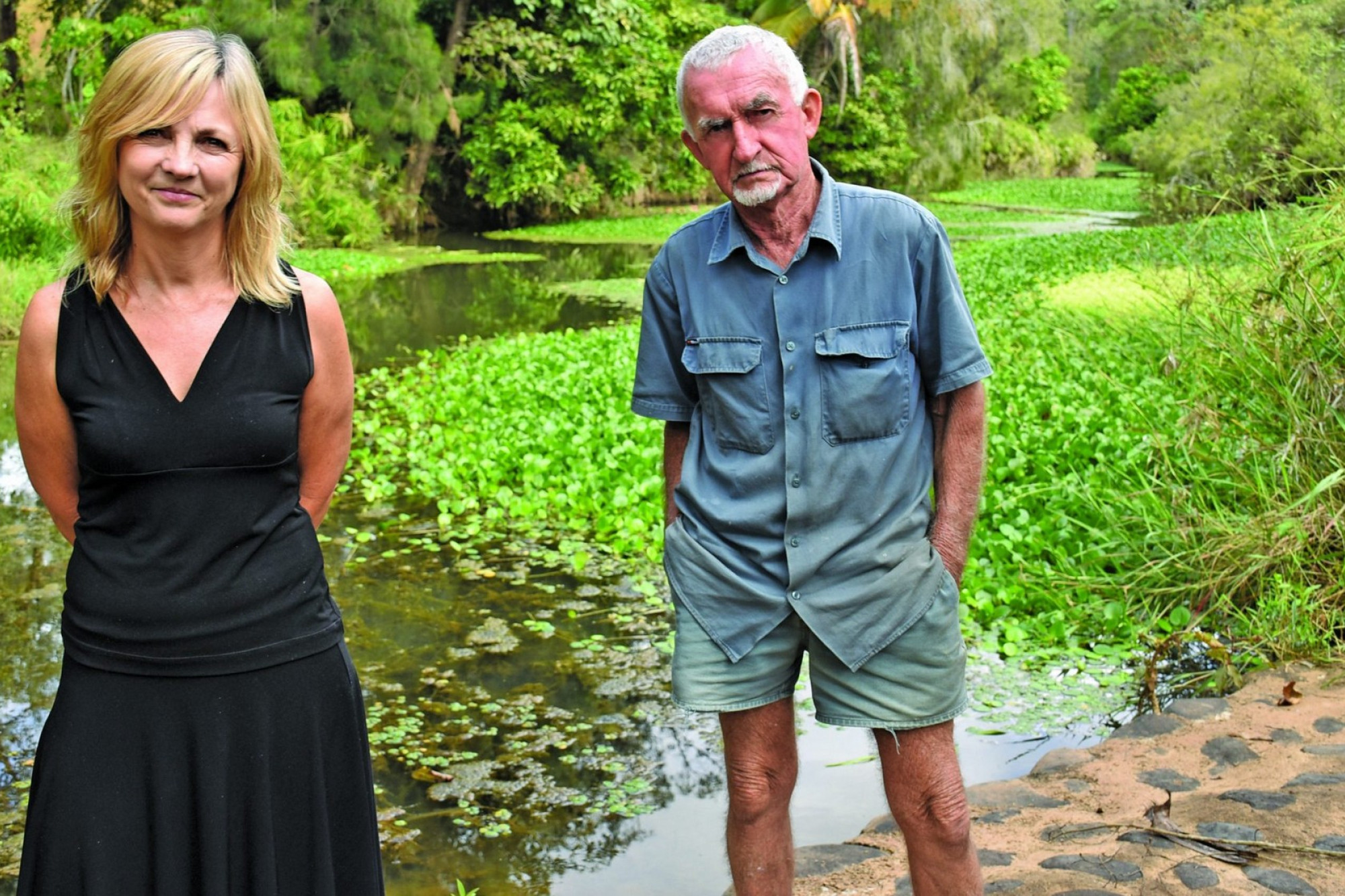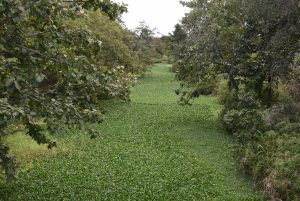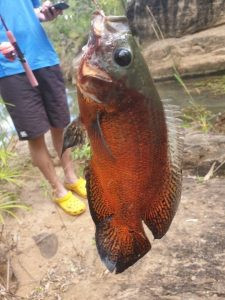General News
16 June, 2020
Creek invaded by pests
Two invasive and dangerous species have been found by local residents in Atherton Creek.

Margie Bestmann has been living on Atherton creek for the past 30 years, her friends and family swim, catch fish and use water from the creek regularly.
In 2017 Margie noticed the creek was changing and a new weed was taking hold, it was slowly smothering the creek and hindering the water flow.
She discovered that it was Amazon Frogbit (Limnobium laevigatum) an invasive weed from South America that is banned in New South Wales and Western Australia and is a declared noxious weed in Victoria.
Ms Bestmann said, “Typically every wet season we get enough rain to flood the creek and flush it out, but back then (2017) we didn't have a decent wet season and that was when the weed took hold.” She said
Frogbit is kept and used in fish ponds, aquariums and water features and can rapidly invade and smother waterways. Plants form into large mats of runners and can develop very quickly. Juvenile plants are easily carried along by water currents and spread to other waterways.
Ms Bestmann has since made phone calls to various councillors at the Mareeba Shire Council, Terrain NRM and Sunwater to get the weed under control with no luck.
It’s believed the weed got into the waterway from the contents of either a fish tank or fishpond being dumped into the creek
Robert Reid who has lived along Atherton creek for the past 15 years said the problem started three years ago and he has been getting the run-around from council and government departments about fixing the problem. “We sent letters to the Member for Cook Cynthia Lui who then forwarded our letter to The Department of Agriculture and fisheries and we never heard back from them.” He said
“I’ve sent a letter to Sunwater who said it wasn’t their problem and Terrain NRM said the same thing.
“I’ve spoken to The Mareeba Shire Council who said that funding to clear the weed had been allocated to another organisation.
“This weed is banned in NSW and WA, they need to ban it here and eradicate from our creeks.”
A council spokesperson said that “Council land protection officers are assisting the Muluridji Ranger Group with the removal and containment of the Amazon Frogbit.”

Atherton Creek smothered with Amazon Frogbit.
A spokesperson for Biosecurity Queensland told the express “On June 4, a letter was sent to Mr Robert Reid addressing the concerns he raised in his correspondence to the Member for Coo," they wrote
"Since it was first detected in 2011 in Queensland, Amazon Frogbit has been found in waterways throughout South East Queensland and Far North Queensland. There is no national agreement for the management or control of Amazon Frogbit in Australia.
"Department of Agriculture and Fisheries scientists have been trialling various herbicides in the hope of finding a suitable control option.
"Biosecurity Queensland works with local councils, landholders, indigenous communities, and environmental groups, to educate on stopping the spread of the weed.”
Amazon Frogbit is not the only species to have invaded Atherton Creek
On Mother’s day of this year, Margie and her family were having a family fishing from the back of their property into the Atherton Creek.
Instead of flowers or chocolates for mother’s day, Margie’s son James landed a fish they had never seen before, originally thinking that it was some sort of Tilapia.
“We had never seen a fish that colour before, so we started asking around, it turned out the fish was an Oscar Cichlid.”
‘Oscars’ (Astronotus ocellatus) are a highly invasive and aggressive species that originates from tropical South America.
Oscar Cichlids are imported into Australia as an ornamental aquarium fish and make their way into waterways as a result of being illegally dumped into local creeks and dams after they get too big for their tanks or when owners no longer want them.

The Oscar Cichlid that was caught in Atherton Creek
A spokesperson from Biosecurity Queensland said;
“Ornamental fish enthusiasts and backyard pond owners should never dump fish. Unwanted aquarium fish should be given to friends or a pet shop instead of letting them go in the wild.
"Oscar Cichlids are territorial and can impact on native fish and plant species when competing for habitat and food and also prey on smaller fish.
"They also cause loss of popular fishing locations by outcompeting and destroying native fish habitats.
"Once Oscar Cichlids become established in a large open waterway they are virtually impossible to eradicate. Although a variety of methods have been tried, there is currently no single, effective broad-scale control method.”
If caught, it’s illegal to release to Oscar Cichlids back into the environment. They should be buried above the high water mark or disposed of in an appropriate waste receptacle.
Sightings of Oscar Cichlids should be reported, together with a photo, online at www.daf.qld.gov.au/fisheries/pest-fish/report-a-pest-fish-sighting or by calling 13 25 23.
The Muluridji Tribal Aboriginal Corporation was approached for comment.



